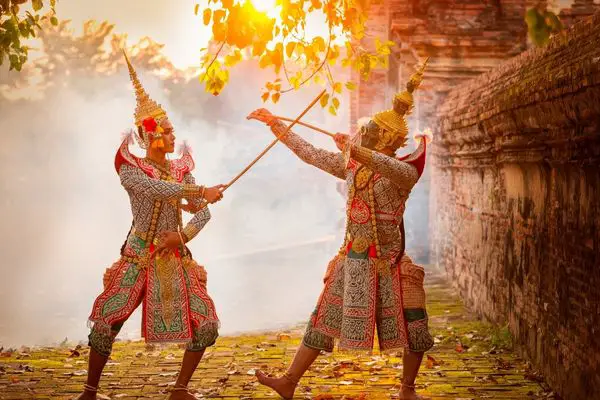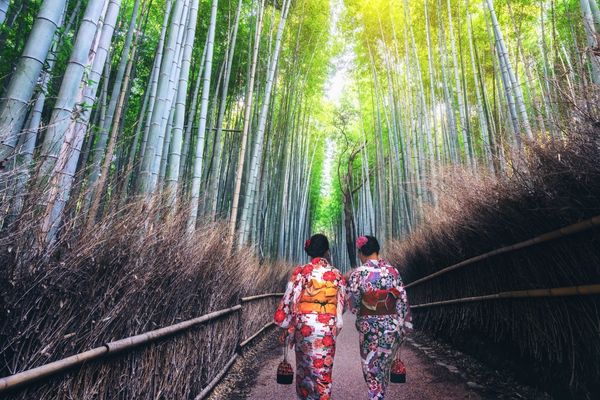
Khon Masked Dance Drama in Thailand, is a performing art that combines musical, vocal, literary, dance, ritual and handicraft elements.
Cultural travel is a subset of tourism that concentrates on learning about a destination’s history, traditions, customs, arts, cuisine, and way of life. It means connecting with them, immersing them in their daily lives, and experiencing and learning about the locals’ distinctive cultural expressions, customs, and values.
Visits to museums, art galleries, historical sites, festivals, and other cultural events are just a few examples of cultural travel. Other options include taking part in local tours, workshops, and classes. Gain greater insight into the local way of life; it can also entail living in conventional lodgings like homestays or guesthouses.
Table of Contents
Cultural travel activities
Exploring cultural travel around the world can come in different shapes and forms.
- Seeing historical sites entails looking around at sights and locations that are very important historically or culturally. Examples include the Colosseum in Rome, the Great Wall of China, and Machu Picchu in Peru.
- Participating in celebrations of a particular culture or custom, such as the Holi Festival in India, Carnival in Brazil, or Day of the Dead in Mexico, is called attending cultural festivals.
- Engaging in local food experiences entails tasting regional food and discovering its history and culture. A few examples are taking a culinary class in Thailand, sampling some street food in Vietnam, or participating in a traditional tea ceremony in Japan.
- Taking lessons or workshops to learn traditional art forms or crafts, such as painting, ceramics, or weaving, falls under the conventional arts and crafts category. Examples include learning to make pottery in Morocco or batik in Indonesia.
- Living with a local family entails residing in a homestay or guesthouse with local family, which can offer a more thorough introduction to the local way of life. Staying with a Maasai family in Kenya or a hill tribal family in Thailand are two examples.
- Investigating local markets entails going there to find out about regional goods, practices, and traditions. As examples, consider going to the souks in Marrakech, Thailand’s floating marketplaces, or Turkey’s bazaars.

Advantages of cultural tourism
Different cultures, customs, and traditions can be experienced and learned about through cultural travel. It can broaden your outlook and aid in developing a deeper understanding and respect for various lifestyles.
Going on a cultural trip can help you hone your communication, adaptability, and open-mindedness skills. It can also make you reevaluate your presumptions and views, which will help you develop and learn in fresh ways.
Visits to historical sites, museums, and cultural events are frequent parts of cultural travel, and these experiences may all be quite intellectually stimulating. Learning about various cultures and historical periods can be exciting and inspiring.
By supporting neighborhood businesses and maintaining cultural heritage, you can positively influence your community by engaging in cultural travel.
Meeting locals and other travelers with similar interests can be facilitated by cultural travel. Through this, cross-cultural friendships and lasting partnerships may develop.
Visiting cultural attractions can also be a way to unwind and revive. Getting out of your comfort zone and experiencing other cultures may be stimulating and reviving.
How to select a cultural destination
The process of selecting a cultural destination may be both exhilarating and difficult. The following advice may assist you in choosing a cultural destination that suits your interests and preferences.
Choose your interests
Think about the facets of culture most appealing to you, such as art, history, music, cuisine, or festivals. This might assist you in reducing your alternatives and concentrating on places that provide cultural experiences relevant to your interests.
Research travel destinations
Look into places that provide the cultural encounters you are interested in. Search for details about the area’s historical monuments, museums, festivals, and customs. Read travel manuals, internet blogs, or social media updates to learn more about the destination’s cultural offers.
Take accessibility and security into account
Take the destination’s accessibility and security into account. Check at the area’s political stability, accessibility to tourism services, and local transit system. This will enable you to have a stress-free and safe cultural travel experience.
Calculate the cost
Calculate the cost of visiting the location and enjoying its cultural attractions. Consider the cost of travel, lodging, food, and entrance fees to cultural attractions. This might assist you in planning your vacation financially and informing your travel decisions.
Talk with locals or cultural specialists
Take into account contacting locals or specialists who may offer perceptions and suggestions on the destination’s cultural offers. This may enable you to have a more unique and authentic cultural experience.
Getting ready for a cultural trip
Packing your baggage and making travel arrangements are only two aspects of preparing for a cultural trip. These are some crucial actions to do to guarantee that your cultural travels go smoothly and are enjoyable.
- Learn about the beliefs, practices, and social mores of the area you intend to travel to. To avoid misunderstandings or cultural gaffes, familiarize yourself with the local dress code, etiquette, and language.
- Consider your hobbies and the cultural attractions of your destination when you create your schedule. Schedule excursions to local markets, cultural events, historical sites, and museums.
- Pack appropriately by bringing clothes suitable for the destination’s temperature and cultural norms. Consider getting a scarf or shawl to cover your head and shoulders if required. Don’t forget to bring along comfortable walking and exploring shoes.
- Acquire any essential travel documentation, such as passports, visas, or proof of immunizations. Verify that the travel documents you are using are valid for the entire duration of your trip.
- Consider purchasing travel insurance to protect yourself from unforeseen circumstances like flight delays or unexpected medical costs.
- Learn some basic words and expressions in the language, such as “hello,” “thank you,” and “where are we?” This can improve your ability to interact with people and demonstrate respect for their way of life.
- Respect regional traditions, social mores, and cultural practices. Avoid acting in ways that could be considered impolite or disrespectful, such as chatting loudly, leaving trash behind, or taking photos without permission.
Enjoying the culture and promoting it
Essential components of cultural travel are experiencing and promoting the local culture. You can engage with and support the local culture throughout your travels in the following ways.
- Engage in cultural activities, such as watching a traditional dance performance, touring a nearby market, or sampling regional cuisine. You may support neighborhood businesses and gain a deeper understanding of the culture there.
- Interact with the community by striking up a discussion or participating in local events. This may provide you with a more unique and authentic cultural experience.
- Respect cultural traditions by dressing appropriately, abstaining from disruptive behavior, and adhering to regional traditions and social norms.
- Shopping locally, dining at nearby establishments, and lodging in locally owned properties are all ways to support neighborhood companies. Both the local economy and regional cultural traditions may benefit from this.
- Ask local tour guides, artists, or historians for advice. You may better comprehend the regional culture and its historical background.
- Support neighborhood charities or organizations by volunteering or donating. This can aid in preserving regional cultural practices and fostering community development.
- When traveling, being mindful of and respectful of local traditions and customs is crucial. Dress codes, conduct in public areas, and religious traditions are a few examples.
- It’s crucial to be mindful of security issues and take protective measures when visiting new places. This can involve taking precautions with valuables, avoiding specific locations at night, and being alert to your surroundings.

- Even if you don’t speak it well, knowing a few simple words will help you interact with locals and respect their culture.
- Traveling between cultures can be unpredictable, so keeping an open mind and being adaptable is crucial. Changes in schedule or unanticipated circumstances can provide an opportunity to try something new.
- Eating your way through a new culture is one of the finest ways to learn about it. Ask for local ideas and don’t be scared to try different foods and flavors.
- Taking the bus or train can be a terrific way to travel and get a feel for the area. But make sure you do your homework on routes and schedules before you go.
- Seeing different cultures offers a wonderful chance to document moments and experiences. Just be mindful when photographing in a sacred or religious setting.
- Festivals, concerts, and other gatherings can help you understand a place’s culture. Make an itinerary based on advanced research on nearby events.
Challenges of cultural travel
Traveling for cultural reasons can be a wonderful and enlightening experience, but it also presents a unique set of difficulties. Navigating cultural differences and unfamiliar customs is one of the biggest hurdles.
- The experience cannot be easy when visiting nations or areas where the culture is significantly dissimilar from your own. For instance, dress regulations, social customs, and communication methods could be very distinct and need some adaptation.
- Language differences present another difficulty. Even if you can explain using simple words, translation errors could obscure subtleties and nuances. It may be challenging to comprehend and respect the culture you are visiting properly.
- Managing the unexpected presents another challenge. Immersing yourself in foreign places while traveling for culture frequently can result in unforeseen circumstances. For instance, you can run into transit problems, delays brought on by the weather or unexpected cultural events. These circumstances can be stressful, and dealing with their calls for flexibility and rapid thinking.
- Finally, visiting different cultures can be psychologically and physically taxing. It frequently entails a lot of walking, environment exploration, and environment adaptation. For those who have physical restrictions or are new to traveling, this can be not easy.
Despite these obstacles, cultural travel may be a richly gratifying experience that broadens your outlook and aids in developing new perspectives. Cultural travel may be a wonderful experience that will improve your life for years to come with careful planning, a willingness to be open-minded, and a spirit of adventure.








